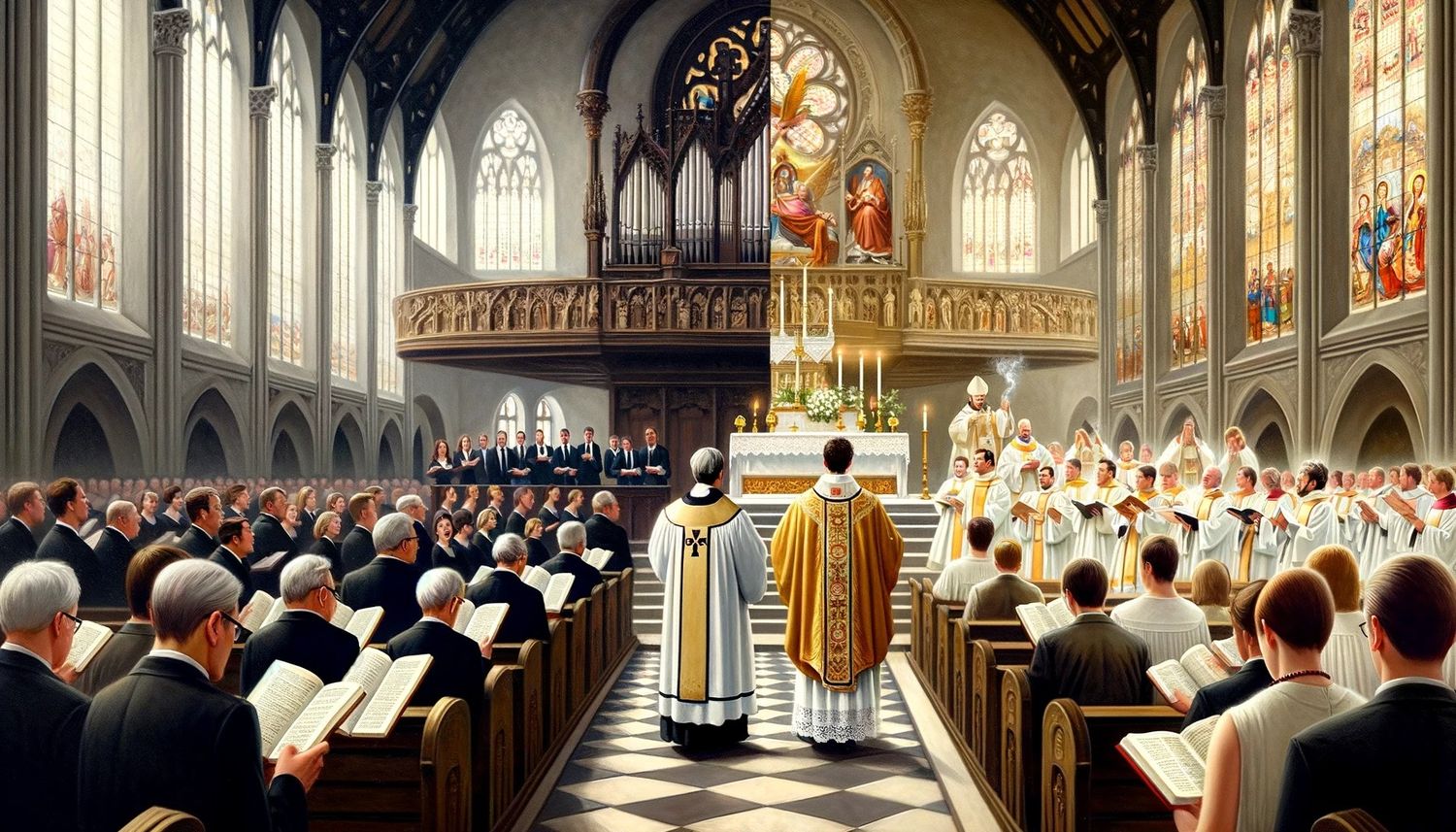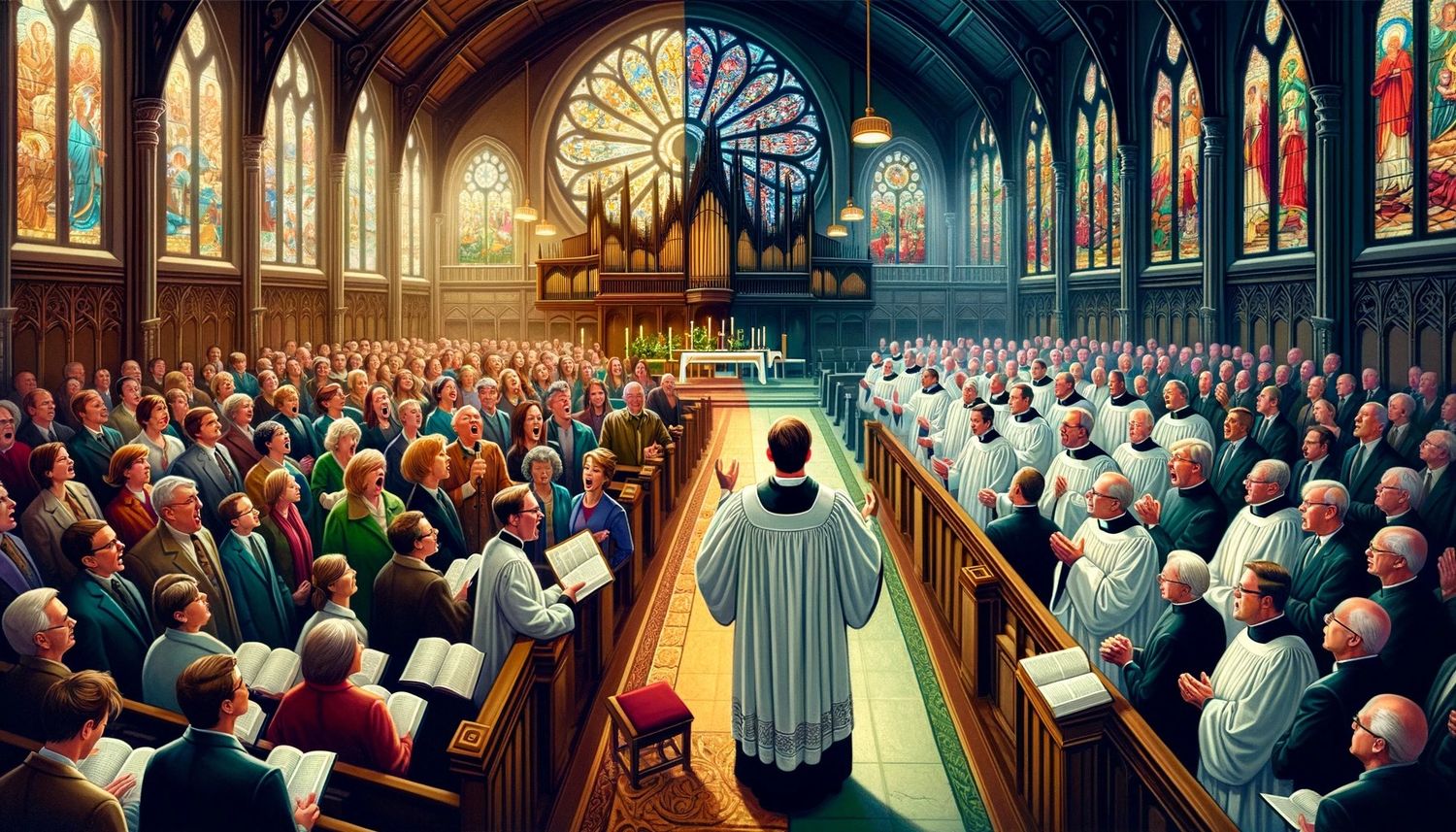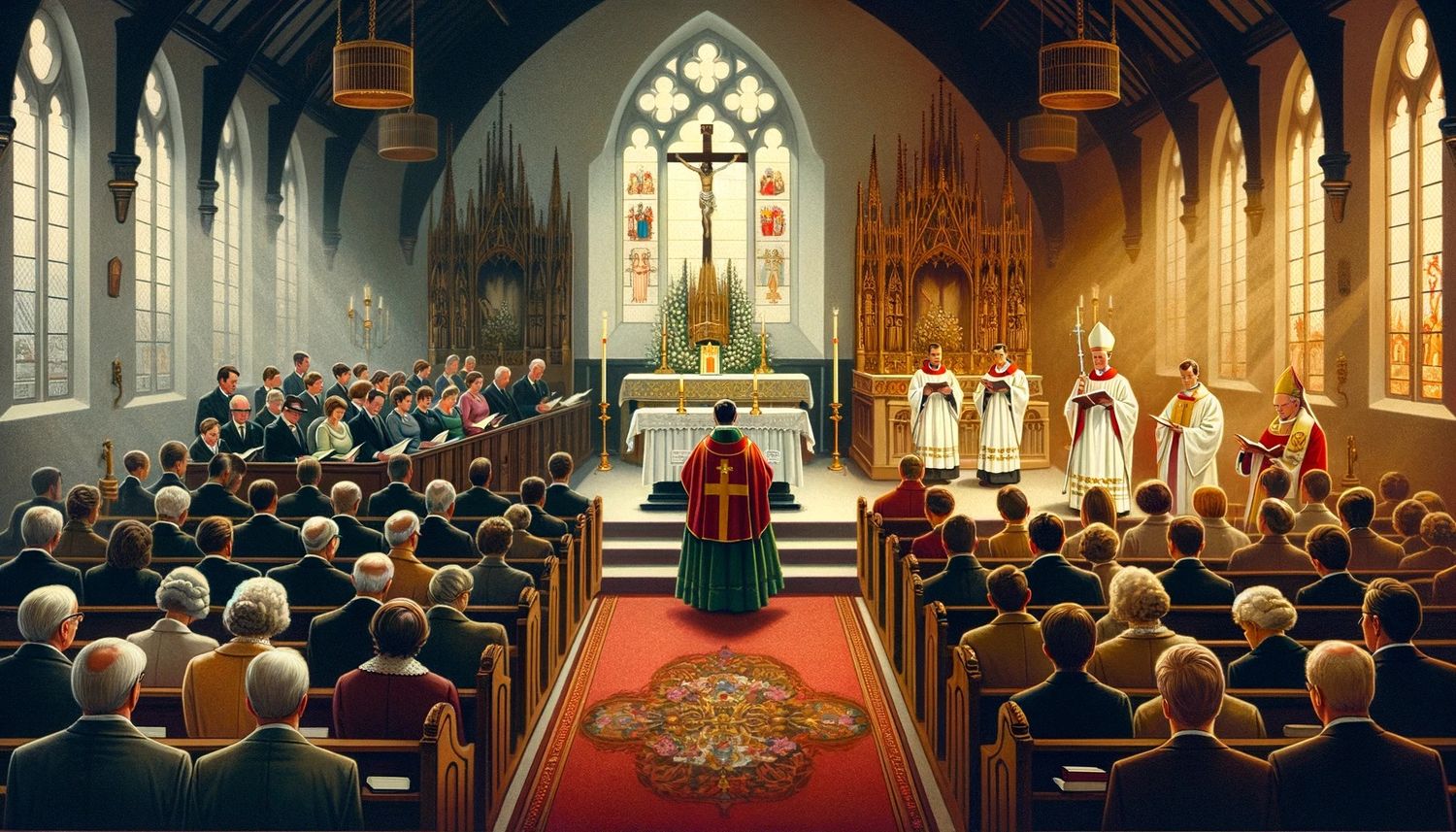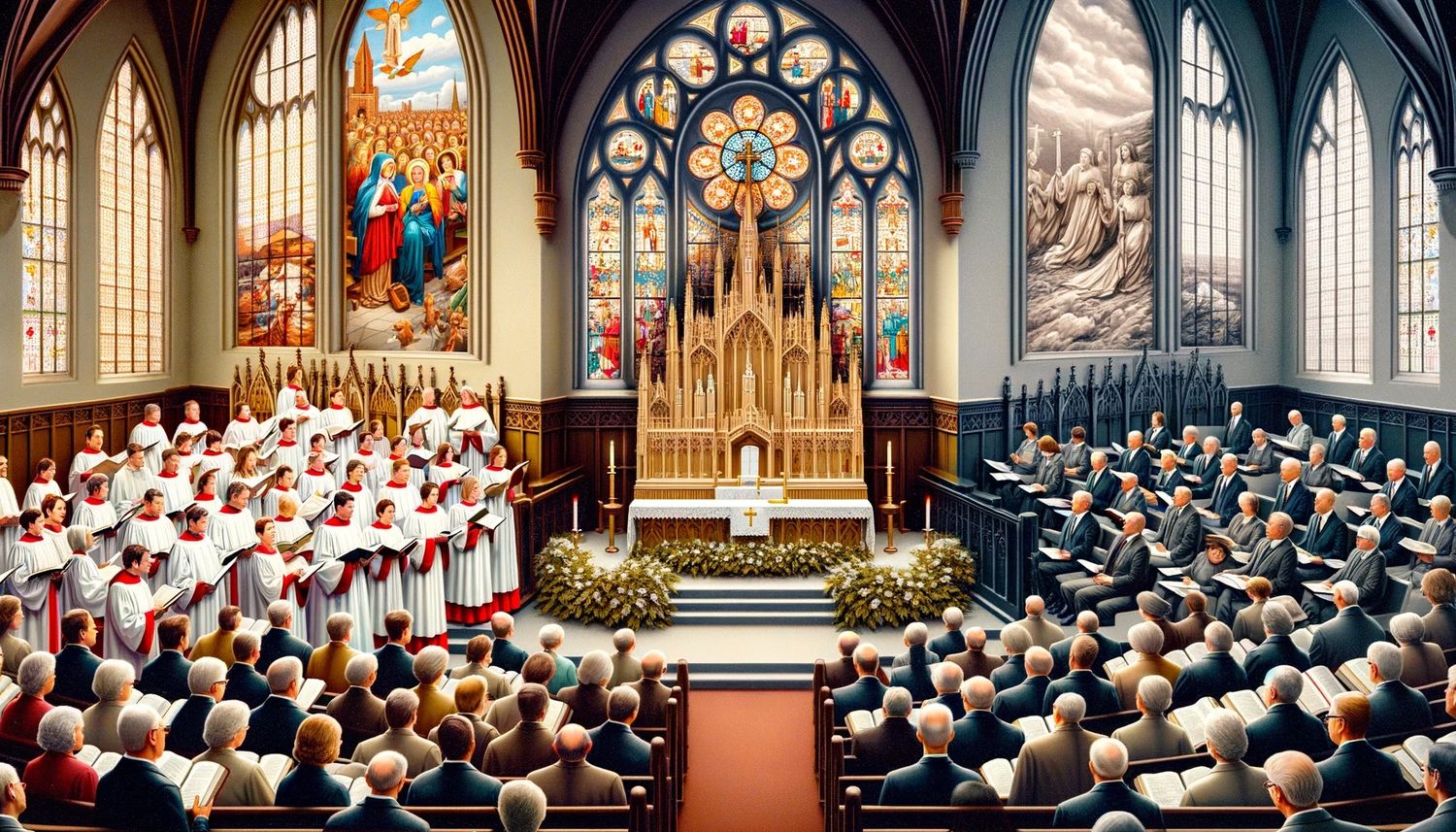Home>Theology and Spirituality>How Does Lutheran Differ From Christianity


Theology and Spirituality
How Does Lutheran Differ From Christianity
Published: March 3, 2024
Jason DeRose, Managing Editor at Christian.net, uses his expertise in religion and journalism to deepen understanding of faith's societal impacts. His editorial leadership, coupled with a strong academic background, enriches the platform’s diverse content, earning him recognition in both journalism and religious circles.
Discover the key differences between Lutheran beliefs and mainstream Christianity. Explore the unique theological and spiritual aspects of Lutheranism. Gain insights into theology and spirituality.
(Many of the links in this article redirect to a specific reviewed product. Your purchase of these products through affiliate links helps to generate commission for Christian.net, at no extra cost. Learn more)
Table of Contents
Introduction
How does Lutheran differ from Christianity? This is a question that often arises when discussing different Christian denominations. Lutheranism is a major branch of Protestant Christianity that follows the teachings of Martin Luther, a German monk and theologian. To understand how Lutheranism differs from Christianity as a whole, it's essential to delve into the history, beliefs, practices, and key differences between Lutheranism and other Christian denominations. This article aims to provide a comprehensive overview of Lutheranism and its distinctions within the broader context of Christianity.
Read more: How Does Lutheran Differ From Catholicism
History of Lutheranism
-
Martin Luther and the Reformation: Lutheranism traces its roots back to the 16th century when Martin Luther, a Catholic monk, initiated the Protestant Reformation. Luther's 95 Theses, which criticized the Catholic Church's sale of indulgences, sparked a movement that sought to reform the church and return to the teachings of the Bible.
-
Formation of Lutheranism: The movement led by Martin Luther gave rise to a distinct Christian tradition known as Lutheranism. Luther's teachings emphasized the concepts of sola scriptura (scripture alone) and sola fide (faith alone), which became foundational principles of the Lutheran faith.
-
Spread of Lutheranism: Lutheranism gained momentum in various parts of Europe, particularly in Germany and the Nordic countries. It was officially recognized as a separate religious tradition, distinct from Roman Catholicism and other Protestant denominations.
-
Key Figures and Confessions: Over time, Lutheranism developed its own theological traditions and confessional documents, such as the Augsburg Confession and the Book of Concord. These writings articulated the beliefs and practices of Lutherans and distinguished them from other Christian groups.
-
Denominational Diversity: As Lutheranism spread, it diversified into different branches and synods, each with its own distinct traditions and interpretations of Lutheran theology. Today, Lutheranism is represented by various church bodies, including the Evangelical Lutheran Church in America (ELCA), the Lutheran Church-Missouri Synod (LCMS), and the Wisconsin Evangelical Lutheran Synod (WELS), among others.
Understanding the historical context of Lutheranism is crucial for appreciating its unique identity within the broader tapestry of Christian history and theology.
Beliefs and Practices of Lutheranism
-
Sola Scriptura: Lutherans believe in the authority of the Bible as the primary source of religious guidance. They uphold the principle of "sola scriptura," which asserts that the Scriptures alone are the ultimate authority for faith and practice. This emphasis on the Bible as the sole norm of doctrine distinguishes Lutheranism from other Christian traditions that may also consider tradition or church teachings as authoritative.
-
Sola Fide: Central to Lutheran theology is the concept of "sola fide," or justification by faith alone. Lutherans believe that individuals are justified, or made right with God, through faith in Jesus Christ, rather than through their own good works or merits. This belief underscores the Lutheran understanding of salvation as a gift of God's grace, received through faith.
-
The Sacraments: Lutherans recognize two sacraments, Baptism and the Eucharist (Holy Communion), as instituted by Christ and essential to the Christian life. They affirm the real presence of Christ in the Eucharist, though the precise nature of this presence may vary among different Lutheran traditions. Baptism is viewed as a means of grace through which God bestows forgiveness of sins and new life in Christ.
-
The Priesthood of All Believers: Lutheranism emphasizes the priesthood of all believers, affirming that all baptized Christians have direct access to God and are called to serve as priests to one another. This belief underscores the democratic and participatory nature of Lutheran congregational life, where members are encouraged to engage in the ministry and governance of the church.
-
Liturgical Worship: Many Lutheran churches follow a liturgical form of worship, characterized by formal rituals, hymn singing, and a structured order of service. The Lutheran liturgy often includes elements such as confession and absolution, the reading of Scripture, preaching, and the celebration of the Eucharist. This liturgical tradition reflects a deep reverence for the historic practices of the Christian faith.
-
Theology of the Cross: Lutherans embrace a "theology of the cross," which emphasizes the paradoxical nature of God's revelation and the Christian life. This theology teaches that God is known most fully in the suffering and humility of Christ, challenging human expectations and assumptions about power and success.
Understanding the beliefs and practices of Lutheranism provides insight into the distinctive theological emphases and spiritual expressions of this Christian tradition.
Comparison with Other Christian Denominations
-
Sacramental Theology: One of the key distinctions between Lutheranism and other Christian denominations lies in their sacramental theology. While Lutherans affirm the real presence of Christ in the Eucharist, some other Protestant traditions, such as Baptists and many Reformed churches, hold to a symbolic or memorial view of the Lord's Supper. Additionally, the number of recognized sacraments varies among Christian denominations, with Lutherans typically acknowledging two sacraments (Baptism and the Eucharist) compared to the seven sacraments recognized in Roman Catholicism.
-
Doctrine of Justification: The Lutheran understanding of justification by faith alone sets it apart from certain Catholic and Orthodox beliefs, which emphasize a synergistic view of salvation involving both faith and works. This theological distinction played a central role in the Protestant Reformation and continues to be a point of divergence between Lutheranism and other Christian traditions.
-
Liturgical Worship: While some Christian denominations, such as Anglicanism and Eastern Orthodoxy, share a liturgical approach to worship with Lutheranism, others, like many evangelical and Pentecostal churches, favor a more spontaneous and expressive style of worship. The use of formal liturgy, sacramental rites, and church calendar observances is a defining feature of Lutheran worship that contrasts with the worship practices of non-liturgical Christian communities.
-
Ecclesiology and Church Structure: The organizational structure and ecclesiological principles of Lutheranism differ from those of other Christian denominations. For instance, the episcopal polity of Anglicanism and the congregational governance of many Baptist churches contrast with the synodical and hierarchical structures found in various Lutheran church bodies. These differences in church governance reflect diverse interpretations of biblical and historical models of church leadership.
-
Theological Emphases: While Lutheranism shares core theological tenets with other Christian traditions, such as the belief in the Trinity and the authority of the Scriptures, it emphasizes certain doctrinal themes distinctively. For example, the Lutheran doctrine of the "priesthood of all believers" and the "theology of the cross" represent theological emphases that may not be as prominent in other denominational expressions of Christianity.
Understanding the comparative aspects of Lutheranism with other Christian denominations sheds light on the diverse theological, liturgical, and ecclesiological landscapes within the broader Christian faith.
Differences in Worship and Sacraments
-
Liturgical Worship: Lutheranism is known for its adherence to a liturgical form of worship, characterized by structured rituals and a formal order of service. The Lutheran liturgy often includes elements such as confession and absolution, the reading of Scripture, preaching, and the celebration of the Eucharist. This emphasis on liturgical worship reflects a deep reverence for the historic practices of the Christian faith. In contrast, many evangelical and Pentecostal churches favor a more spontaneous and expressive style of worship, often incorporating contemporary music, informal prayer, and testimonies.
-
Sacramental Theology: Lutherans recognize two sacraments, Baptism and the Eucharist, as essential components of Christian life and worship. They affirm the real presence of Christ in the Eucharist, though the precise nature of this presence may vary among different Lutheran traditions. Baptism is viewed as a means of grace through which God bestows forgiveness of sins and new life in Christ. In comparison, some other Protestant traditions, such as Baptists and many Reformed churches, hold to a symbolic or memorial view of the Lord's Supper. Additionally, the number of recognized sacraments varies among Christian denominations, with Lutherans typically acknowledging two sacraments compared to the seven sacraments recognized in Roman Catholicism.
-
Church Calendar and Lectionary: Lutheranism observes the liturgical calendar, which includes seasons such as Advent, Lent, Easter, and Pentecost, each with its own distinct themes and observances. The use of a lectionary, a set schedule of Scripture readings for worship services, is also common in Lutheran congregations. This structured approach to the church calendar and lectionary readings provides a framework for worship that is rooted in the biblical narrative and the life of Christ. In contrast, some non-liturgical Christian communities may place less emphasis on the observance of the church calendar and may follow a more flexible approach to selecting Scripture readings for worship.
-
Ceremonial Practices: The use of ceremonial vestments, liturgical colors, and formal rites in worship is a characteristic feature of Lutheran liturgical tradition. Clergy members often wear specific attire, such as robes or stoles, to signify their roles in leading worship and administering the sacraments. Liturgical colors, such as purple for Lent and white for Easter, are employed to symbolize the themes of different seasons and festivals. The incorporation of ceremonial practices adds a sense of reverence and continuity to Lutheran worship, distinguishing it from the more informal and less ceremonial practices found in some non-liturgical Christian traditions.
Understanding the differences in worship and sacraments between Lutheranism and other Christian denominations provides insight into the diverse expressions of Christian faith and the rich tapestry of worship practices within the broader Christian community.
Lutheran Views on Salvation and Justification
Lutheran theology places a strong emphasis on the concepts of salvation and justification, which are central to the Christian faith. The Lutheran perspective on salvation is rooted in the belief that individuals are justified, or made right with God, through faith in Jesus Christ alone. This principle, known as "sola fide" (faith alone), stands as a foundational tenet of Lutheran doctrine. According to this view, salvation is not earned through good works or human merit, but is received as a gift of God's grace, apprehended by faith in the atoning work of Christ on the cross.
Lutherans affirm that human beings are inherently sinful and incapable of achieving righteousness on their own. The doctrine of "sola gratia" (grace alone) underscores the Lutheran understanding that salvation is entirely the result of God's unmerited favor and love for humanity. This perspective contrasts with certain theological positions within Catholicism and Eastern Orthodoxy, which emphasize a cooperative relationship between God's grace and human effort in the process of salvation.
The Lutheran view of justification emphasizes the forensic nature of God's declaration of righteousness upon the believer. Through faith in Christ, individuals are reckoned as righteous in God's sight, not on the basis of their own moral performance, but on account of the imputed righteousness of Christ. This understanding of justification as a legal declaration of righteousness, rather than a transformative process of moral improvement, distinguishes Lutheran theology from certain Catholic and Orthodox teachings on salvation.
Furthermore, Lutherans maintain that good works are the fruit of faith and gratitude toward God, rather than the means of earning or maintaining salvation. While acknowledging the importance of ethical living and acts of charity, Lutheranism emphasizes that these works are the result of God's sanctifying work in the believer's life, rather than the grounds for their acceptance by God.
In summary, the Lutheran perspective on salvation and justification underscores the primacy of God's grace and the centrality of faith in Christ as the means by which individuals are reconciled to God. This theological framework reflects the enduring legacy of the Protestant Reformation and continues to shape the distinct identity of Lutheranism within the broader landscape of Christian thought and practice.
Conclusion
In conclusion, Lutheranism stands as a distinctive branch within the tapestry of Christianity, shaped by its historical roots, theological emphases, and liturgical practices. The rich legacy of Martin Luther and the Protestant Reformation has left an indelible mark on the development of Lutheran theology and spirituality. The emphasis on sola scriptura, sola fide, and the priesthood of all believers has contributed to the unique identity of Lutheranism within the broader Christian tradition. The sacramental theology, liturgical worship, and doctrinal distinctives of Lutheranism set it apart from other Christian denominations, while also reflecting a shared commitment to the core tenets of the Christian faith. Understanding the differences and similarities between Lutheranism and other Christian traditions enriches our appreciation for the diverse expressions of Christian belief and practice. As Lutherans continue to engage in dialogue and cooperation with fellow Christians, the distinct contributions of Lutheranism serve to enrich the collective witness of the Christian community and foster a deeper understanding of the multifaceted nature of the Christian faith.














